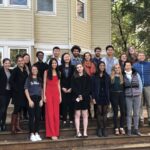This edition of Neptune News is going to be a little different—I’m going to be talking from my own personal perspective. I started the Neptune Project when I was twelve as a way to fight lead poisoning. I was heartbroken reading about the stories of children in Flint who had their health taken away from them simply because the city changed the water sources that serviced their homes without checking for its safety.
I soon learned there were hundreds of communities like Flint, Michigan throughout the country. I began doing data analysis to find correlations between different covariates and lead exposure. One conclusion was abundantly clear—communities of color are disproportionately affected by lead poisoning. I’ve pushed myself to think about why this is, how it happened, and what else it reveals about the way the US was structured. Redlining pushed people of color into areas near environmental hazards and contaminants. Discrimination in the medical system blocked access to quality healthcare, which often includes lead testing at twelve and twenty-four month checkups for children. I will continue to work hard to bring justice to the four million American households effected by lead poisoning.
Now seventeen, living through this movement for racial equality, I’ve seen so many of my young peers seeking for ways to engage, ways to make change. Inequality has been engrained into our everyday lives in ways we might not even see at first. Through pursuing my interest in using science for good, I learned one of those ways is through lead poisoning. I wanted this to serve as a reminder that there is no limit to the ways for us to make change no matter our age. There is room for all types of efforts, initiatives, and routes towards social change. We all have our individual skillsets, and through applying ourselves, we can stand up for a better tomorrow.



